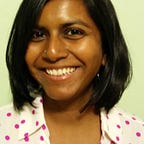Meet Barbara. She works on software that’s used in over 5000 hospitals!
She talks about her role as a Senior Software Engineer at 3M and her experience in Healthcare Tech
Tell us about yourself
I was born in Puerto Rico to two teachers: my father taught Spanish and my mother taught English. My father was old-school and was not a fan of technology, so my three sisters and I did not get a computer until I was in high school.
My sisters used the computer to do fun things like making banners and greeting cards, but I went beyond that by learning DOS commands, reinstalling the OS, and “upgrading” the modem to a lightning-fast 56k.
I started college as a pre-med major, but I switched to Information Systems. My parents instilled me with an interest in language, and I believe that compelled me to learn programming languages.
What are your hobbies?
I enjoy cooking especially baking. Lately, I have been doing a lot of craft and other DIY projects along with my twin sister Faviola. My fiance and I own two cats Paolo and Luke and a chihuahua named Tofi.
What do you work on?
Currently, I work at 3M HIS (Health Information Systems), we use Agile methodologies to tackle our projects; think about a big puzzle with each team working on one piece and when it all comes together it produces a System that provides healthcare solutions for 5,000 hospitals worldwide.
As part of a Scrum team, we work together to get our part of the product delivered; this means that my role is not only of a software developer, but sometimes a tester, or analyst or customer support.
How did you get into IT Healthcare?
I worked on a contract that supported the Armed Forces Health Longitudinal Technology Application (AHLTA); an electronic medical record system used by the U.S. DoD. I had applied for this opportunity with zero knowledge on IT Healthcare, but my previous experience with large scale systems helped me get that job. I then used that experience when I applied at 3M HIS.
When I started this job one thing I had to get familiar with was ICD-10 which is a code set for healthcare diagnoses. The U.S. made October 1, 2015, the deadline for hospitals to begin using this new set of codes. It felt like Y2K all over again but we survived and it was a great learning experience! I also had to get myself familiarize with HIPPA and the importance of security measures and compliance to protect patient data.
How did you first get started in your career in tech?
One thing I decided when I was in college was that I was going to get the most out of my education, so I took as many technical classes as I could.
One of them was an Oracle Developer PL/SQL class. This class helped me when I applied for an internship at Verizon, which resulted in my first job after I graduated. Internships really help in getting your feet wet in the business world.
“Internships really help in getting your feet wet in the business world.”
What are the most important skills to have for someone in your position?
Listening is the most important skill. Listening to your clients leads to higher customer satisfaction. Listening to your peers and respecting their input is instrumental for personal and professional growth.
As you were gaining experience, how did you go about transitioning to a higher position?
I learned early in my career that if you want something, you need to say it. Don’t be afraid to share your career interests with others, including your manager/supervisor, because you cannot assume that they know what your goals are.
“I learned early in my career that if you want something, you need to say it. “
Don’t get too comfortable in one position. Learn about all the phases of the software development lifecycle and get involved in other phases as much as you can. There will be times where coding is not the priority and you need to help get a product deployed by doing QA or writing documentation.
What are some difficulties you faced in your career? How did you overcome them?
Stereotyping and gender bias have been, and still are, the biggest difficulties for me to face. I can’t say that I have overcome them because, sadly, this is still the reality for many women.
I am optimistic with the many initiatives designed to promote gender equality in the workplace, and I am confident that gender barriers will be overcome as younger generations break into the workforce.
Is it important to have mentors and mentor other people? Why?
Mentors are a crucial element for success. A mentor challenges you and can provide invaluable insight into how the actions you take can affect your career and/or your personal life.
“A mentor challenges you and can provide invaluable insight into how the actions you take can affect your career and/or your personal life.”
For me, having multiple mentors has been very helpful. My mentors have helped me with many things, including my English pronunciation, my business language skills, salary negotiations, adapting to my new job, and much more.
Where can we find you?
You can find me on Twitter and LinkedIn.
Originally published at blog.codewithveni.com on September 6, 2016.
If you’d like more inspiring stories about women in tech and coding resources, join the Code with Veni — Women in Tech newsletter here.
If you liked this post, click the 💚 below so other people will see this here on Medium. Follow me for more articles on women in tech and on learning to code.
